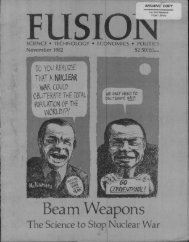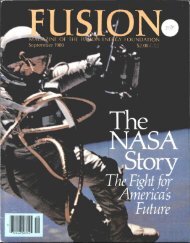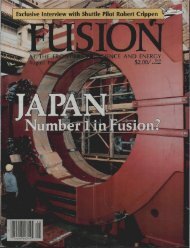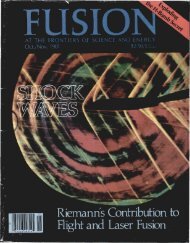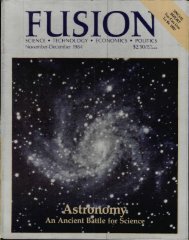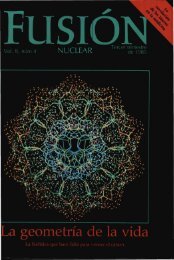Logos
Logos
Logos
- No tags were found...
You also want an ePaper? Increase the reach of your titles
YUMPU automatically turns print PDFs into web optimized ePapers that Google loves.
23. Plato Timaeus, Zoakos et al., trans., The Campaigner, February 1980.24. For an example, see Aristotle Metaphysics, Book XII.25. Drummon, op. cit.26. Philo On the Creation of the World, 7-8.27. Ibid., 10-12.28. Ibid., 17-20.29. Ibid., 22.30. Philo Allegorical Interpretation, I, 21-23.31. Ibid., 16.32. lbid., 37.33. Philo On Abraham, 120.34. Ibid., 122.Notes 36. _s Philo On To Prove Flightand ThatFinding, Every Man 109. Who Is Virtuous Is Also Free.37. The Coming Doom, from Gaster, Theodor H., Dead Sea Scriptures,Doubleday, 1956.1. The Council of Nicaea was convened to settle the issue of the 38. Suetonius Claudius, 25.heresy of Arianism and related theological disputes that had accumu- 39. Eusebius EcclesiasticalHistory, II, 18.lated in previous decades. At the gathering of the world's bishops, 40. Ibid., II, 20.Alexander and Athanasius represented the "orthodox," while the 41. Ibid.heretics were represented by an Egyptian-led coalition that included 42. Ibid., II, 21.forces sympathetic to Emperor Constantine. At issue was Arius's 43. Ibid., II, 2.Aristotelian heresy, which denied the divinity of Jesus Christ and held 44. Ibid., If, 1.that Christ was merely a creation of the Father. The final declaration of 45. Suetonius Gaius Caligula, 52.the Council developed the famous formula of homoousios, which held 46. Ibid., 36.that Jesus Christ was "of the same substance" and nature as God the 47. Ibid., 30. ,Father. Although this formula became the basis of Christian doctrine 48. Suetonius reports furthermore that at one point Caligula consideredthrough the ages, the heresy of Arius and his allies was not vanquished, removing the capital of the empire from Rome to Alexandria, whichand in the years immediately following Nicaea they split the church indicates his propensity to worship the Isis cult, long based in Egypt.into its eastern and western factions. (Gaius Caligula, 49.)2. In fact, it was not until the mid-third century that a Roman emperor 49. Justin Martyr First Apology, 26.emerged who clearly associated himself with the Christian movement. 50. Ibid.; see also Athanagoras, Suppl., Tertullian, Apology, 7; MiniciusThat was Philip the Arabian, emperor from 244 to 249. Felix, Octavius, 9.3. See Criton Zoakos, "Aristotle and the Craft of Political Intelli- 51. Justin Martyr, Ibid., 26.gence," The Campaigner, Sept./Oct. 1978. 52. Ibid.4. According to a discussion between the author and Paul Arnest in 53. Eusebius, op. cit., 11.13.November 1978. 54. Ibid.5. Attalus Ill was to add his kingdom to the bequest of the Magna 55. Ibid.Mater stone. He ceded Pergamum to the Roman Empire at lais death in 56. Ibid., II, 17.133 B.C.. 57. Hans Jonas, The Gnostic Religion., Beacon Press, Boston, 1958, p. 23.6. Polybius VI, 56. 58. Ibid., p. 25.7. Cicero Laws. 59. Elaine Pagels, in The Gnostic Gospels cites these and other works in8. Zoakos, op. cir. attempting to portray the gnostics as merely an "alternative" form of9. Sec Robert Dreyfuss, "The Method of PhiloJudaeus," The Cam- Christianity. See the review of her book by this author, in Thepaigner, December 1978. Campaigner, March 1980.10. By "elite," we do not mean an elite in the sense of class or caste, but 60. Jonas, op. cit., pp. 103-11.one so qualified by participation in the knowledge of the most advanced 61. Suetonius Claudius, 25.epistemology and real political science. For a full discussion of this 62. Suetonius Nero, 26.topic, see Lyndon H. LaRouche, Jr., "The Secrets Known Only to the 63. Ibid., 28.Inner Elites," The Campaigner, May/June 1978. The present article was 64. Ibid., 29.inspired as a case study of the principle outlined n LaRouche's ground- 65. Ibid., 36.breaking article. 66. Ibid., 56.11. PhiloJudaeus The Decalogue, 4-9. 67. Ibid., 37.12. See H. A. Wolfson, Philo, 2 vols., Harvard University Press, 1947. 68. Tacitus Annals of Imperial Rome, xiii, 32.Wolfson's work is by far the best available in English on Philo. Another 69. Ibid., xiv.rewarding book is PhiloJudaeus, by James Drummond, 2 vols., London, 70. Suetonius Nero, 39.Williams and Norcross, 1888. 71. Tacitus, op. cit., p. 50.13. Josephus The Jewish Wars. 72. Spence, op. cit., p. 50.14. Cicero On Flaccus, cited in Early Christianity and Paganism by Donald 73. John Ferguso n, Religions of the Roman Empire, Cornell UniversityM. Spence, E. P. Dutton, New York, 1902. Press, Ithaca, New York, 1970.15. Mark Burdman, "How Britain's Biggest Racists Created Zionism," 74. Irenaeus Adv. Haer. 11I,3."!TzeCampa(¢ner, December 1978. 75. Eusebius, op. cit., II1, 28.16. Joseph Klausner, FromJesus to Paul, Beacon Press, Boston, 1961. 76. Ibid., llI, 32.17. Philo On Dreams. 77. Ibid.18. Philo On the Creation of the World Accordingto Moses. 78. Pliny, Letters of the Younger Pliny, Penguin Books, London, 1963,19. Philo On Flight and Finding, 33. See also Erwin R. Goodenough, Book Ten, 96.Politics oJ'PhiloJudaeus, Georg Olms Verlagsbuchhandlung, Hildesheim, 79. Eusebius, op. cit., p. 82.Germany, 1967. 80. Spence, op. cit., p. 82.20. Philo, Ibid. 49. 81. From "The Martyrdom of Polycarp." See Early Christian Writings,21. Philo On the Unchangeability of God, 176. translated by Maxwell Staniforth, Penguin Books, 1968.22. Philo On Flight and Finding, 109. 82. toc. cir.70 August 1980 / CAMPAIGNER



